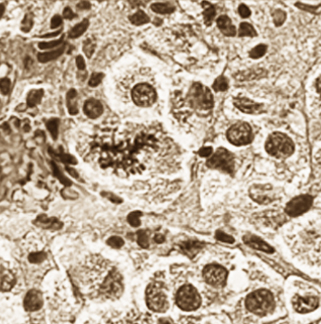When imaging detects a region of interest or suspicion, it can also be used to direct selective biopsies to obtain very small tissue samples for further laboratory analysis (pathology). The use of imaging together with pathology gives the most accurate information about the size, location and aggressiveness of any cancer thus identified.
Melanoma
 Malignant melanoma, one of the most lethal cancers, is increasing at an alarming rate. It is the leading cause of death in women aged 20-43 years. Importantly, only 1 out of 33,000 moles are malignant and sonography may prevent unnecessary biopsies. The chance of aggression is related to the tumor depth. Tumors less than 1 mm are often cured by biopsy. Disease greater in penetration is readily imaged by 3D Volumetric probes and non-palpable foci of tumor extension or lymph node (glands) involvement are visible in the scanned area. The metastatic potential is measured by the 3D Doppler study and follow up of distant tumor spread may be correlated with serial sonography. Some invasive surgical diagnostic procedures may be avoided by using high resolution imaging since scans detect tumor nests as small as 2 mm in the lymph nodes. This means that a sonogram guided needle biopsy may avoid the necessity of a massive radical operative dissection of otherwise healthy tissues.
Malignant melanoma, one of the most lethal cancers, is increasing at an alarming rate. It is the leading cause of death in women aged 20-43 years. Importantly, only 1 out of 33,000 moles are malignant and sonography may prevent unnecessary biopsies. The chance of aggression is related to the tumor depth. Tumors less than 1 mm are often cured by biopsy. Disease greater in penetration is readily imaged by 3D Volumetric probes and non-palpable foci of tumor extension or lymph node (glands) involvement are visible in the scanned area. The metastatic potential is measured by the 3D Doppler study and follow up of distant tumor spread may be correlated with serial sonography. Some invasive surgical diagnostic procedures may be avoided by using high resolution imaging since scans detect tumor nests as small as 2 mm in the lymph nodes. This means that a sonogram guided needle biopsy may avoid the necessity of a massive radical operative dissection of otherwise healthy tissues.
Breakthroughs in GENE THERAPY are making great strides in tumor control, however, treatment response may change over the course as the cancer genes try to outsmart the therapy. Doppler Histogram Analysis is a surrogate method of documenting success or failure by measuring the tumor vessel density. This quantifiable and well tolerated technique is uniquely available at the Bard Cancer in the United States at this time.
 BARD CANCER DIAGNOSTICS is founded on the commitment to explore and implement the latest diagnostic technologies as a means of building the proper treatment strategy of many types of cancers. We also specialize in the PREVENTION solutions for our patients who strive to maintain a health-conscious lifestyle as well as those who are at increased risk of certain diseases by confirming that their efforts to prevent disease are working.
BARD CANCER DIAGNOSTICS is founded on the commitment to explore and implement the latest diagnostic technologies as a means of building the proper treatment strategy of many types of cancers. We also specialize in the PREVENTION solutions for our patients who strive to maintain a health-conscious lifestyle as well as those who are at increased risk of certain diseases by confirming that their efforts to prevent disease are working.
BARD CANCER DIAGNOSTICS
121 E. 60th St. Suite #6A New York, NY 10022
212.355.7017
Info@bardcancercenter.com






